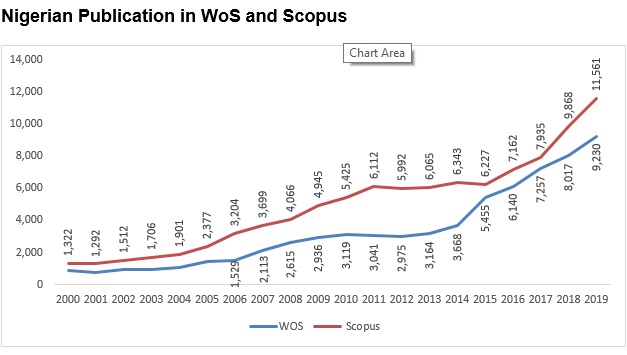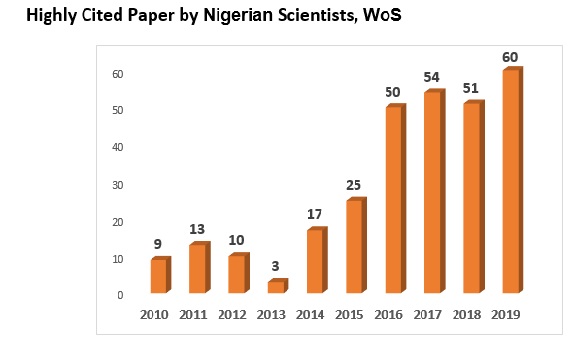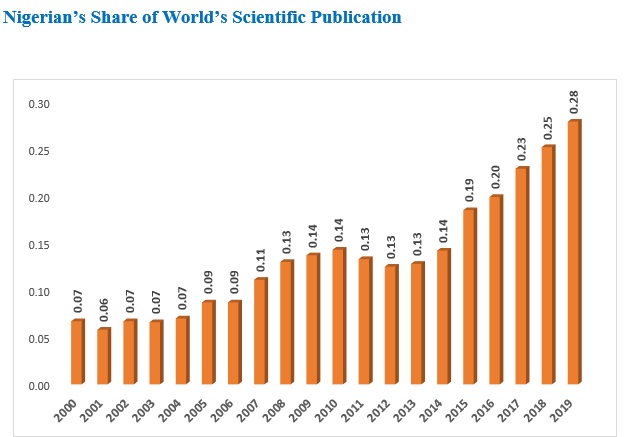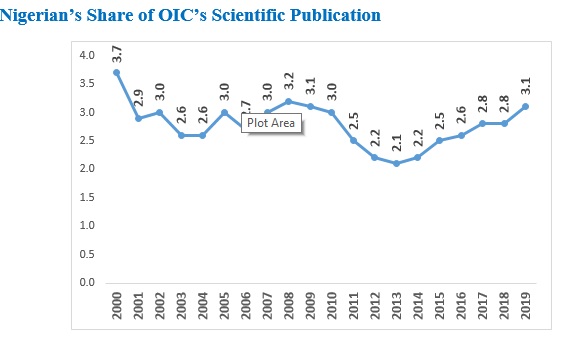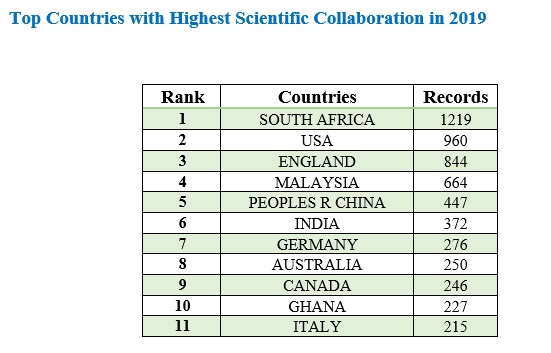Higher Education System in Nigeria
Nigeria’s participation in Higher Education dates back to 1932 with the establishment of Yaba College of Technology, Yaba Lagos, followed by the establishment of University College, Ibadan as an affiliate of University of London in 1948.
The Present Higher Education System
Nigeria's higher education system consists of Universities, Polytechnics and Colleges of Education.
1. Technical and Vocational Education and Training (TVET) Institutions.
These institutions offer technical and vocational education training (TVET) falling outside the Universities. They comprise of non-university tertiary technical education training institutes such as Polytechnics, Colleges of Science and Technology, Institutes of Science and Technology and Monotechnics, offering a wide variety of technological, science and business oriented educational training leading to the award of National Diploma ND, Higher National Diploma HND and post HND in Nigeria. The curriculum is designed to expose students to high level classroom theories, workshop practicals and industrial experiences.
The National Board for Technical Education NBTE is the supervisory board that oversees the operations and development of technical and vocational education in Nigeria. The NBTE was established by Act 9 of January 1977.
2. Colleges of Education
The College of Education system is one of the tripods of tertiary education in Nigeria and it has the primary role of training teachers who will be awarded the minimum teaching qualification of Nigerian Certificate of Education (NCE). This certificate qualifies one to teach in junior secondary schools and technical colleges in Nigeria. These teachers’ institutions were formally known as Advanced Teachers’ Colleges and were affiliated to different universities in Nigeria. They were later transformed into Colleges of Education under the supervision of the National Commission for Colleges of Education (NCCE) which was established by Decree 13 of 1989 to supervise all aspects of non-degree teacher education and teacher professionalism in Nigeria.
3. Universities
Nigeria possesses the largest university system in Sub-Saharan Africa. With Federal, State and Private Universities enrolling over 2 million students as of 2018. Its university system supports numerous graduate and post graduate programs. The system embraces much of the country’s research capacity and produces most of its skilled professionals. University education in Nigeria is regulated by the National Universities Commission (NUC) which was established in 1962.
The Nigerian University System comprises of 171 Universities made up of:
- • 44 Federal Universities
- • 48 State Universities and;
- • 79 Private Universities.
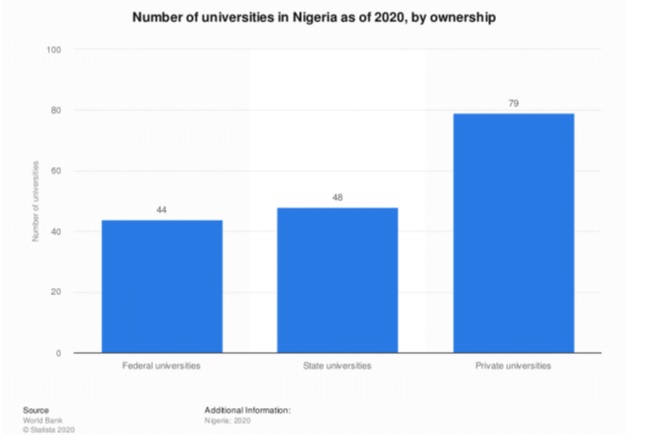
3a. University Student Enrolment
By the end of 2018 overall enrolment for undergraduate and postgraduate programmes in the Nigerian university system stood at 2,041,291.
The approximate yearly graduate turnout is 236,925.
Federal Universities - 66.1%
State Universities - 27%
Private Universities - 6.9%
Total 100%
As of 2018, the National Open University of Nigeria was the largest university in the country in terms of number of students. That year, the number of undergraduate and postgraduate students reached 471 thousand. The National Open University of Nigeria is the largest open and distance learning institute on the whole African continent. It is based in Abuja, but has several campuses across Nigeria.
3b. Staffing in Nigerian Universities
The total staff strength including Academics and Non Academics in the system.
- • Professors - 11,120
- • Academic Staff - 67,680
- • Non-Academic Staff - 135,754
- • Academic Staff - 33%
- • Non Academic Staff - 67%
3c. Quality Assurance in the Nigerian Higher Education System
Quality Assurance (QA) in higher education is a systematic process of assessing and verifying inputs, outputs and outcomes against standardized benchmarks of quality. Typically it involves the setting up of National Benchmark Minimum standards, self-study and onsite visits for purposes of evaluating compliance with set standards in terms of human and material resources, teacher-student ratios, standards of exams etc.
The different categories of higher education institutions in Nigeria are regulated by autonomous Quality Assurance agencies;
The National Universities Commission (NUC) is the QA agency responsible for the regulation of university education in Nigeria;
The NUC sets academic standards and accredits all academic programs in the Nigerian University System (NUS) using guidelines stipulated by the Benchmark Minimum Academic Standards (BMAS).
4. Quality Assurance Mechanism in Nigerian Universities: Indicators for Accreditation
• Academic Content
• Staffing
• Physical Facilities
• Library
• Funding
• Employer’s rating
Accreditation Status
• Full Accreditation – At least 70% in all four core areas (Academic Content, Staffing, Physical Facilities and Library)
• Interim Accreditation – Less than 70% in at least one of the four core areas, including between 60 and 69% aggregate score
• Denied Accreditation – Less than 60%
5. World Ranking of Nigerian Universities
• Nigeria has 6 universities in the overall Times Higher Education World University Rankings (2020) the highest-ranking university in Nigeria is University of Ibadan, which is ranked at number 401–500.
TOP UNIVERSITIES IN NIGERIA (2020)
University Rank*
• University of Ibadan 401–500th
• Lagos State University 501–600th
• University of Lagos 601–800th
• Covenant University 801–1000th
• University of Nigeria Nsukka 1001+
• Obafemi Awolowo University 10001+
Challenges of Higher Education in Nigeria
● Inadequate Funding and budgetary constraints
● Poor policy Implementation
●Inadequate skilled workforce
● Brain Drain
● Disconnect between supply and demand (graduates and labor market).
The Way Forward
● Institutional Leadership and Management;
● ICT development for teaching, learning and research;
● Increased Funding for Higher Education;
● Graduate fellowships and small grants for PhD support; and
● Linking universities to the productive sectors of the economy through policy research.
Nigerian Publication in WoS and Scopus
3a. University Student Enrolment
By the end of 2018 overall enrolment for undergraduate and postgraduate programmes in the Nigerian university system stood at 2,041,291.
The approximate yearly graduate turnout is 236,925.
Federal Universities - 66.1%
State Universities - 27%
Private Universities - 6.9%
Total 100%
As of 2018, the National Open University of Nigeria was the largest university in the country in terms of number of students. That year, the number of undergraduate and postgraduate students reached 471 thousand. The National Open University of Nigeria is the largest open and distance learning institute on the whole African continent. It is based in Abuja, but has several campuses across Nigeria.
3b. Staffing in Nigerian Universities
The total staff strength including Academics and Non Academics in the system.
- • Professors - 11,120
- • Academic Staff - 67,680
- • Non-Academic Staff - 135,754
- • Academic Staff - 33%
- • Non Academic Staff - 67%
3c. Quality Assurance in the Nigerian Higher Education System
Quality Assurance (QA) in higher education is a systematic process of assessing and verifying inputs, outputs and outcomes against standardized benchmarks of quality. Typically it involves the setting up of National Benchmark Minimum standards, self-study and onsite visits for purposes of evaluating compliance with set standards in terms of human and material resources, teacher-student ratios, standards of exams etc.
The different categories of higher education institutions in Nigeria are regulated by autonomous Quality Assurance agencies;
The National Universities Commission (NUC) is the QA agency responsible for the regulation of university education in Nigeria;
The NUC sets academic standards and accredits all academic programs in the Nigerian University System (NUS) using guidelines stipulated by the Benchmark Minimum Academic Standards (BMAS).
4. Quality Assurance Mechanism in Nigerian Universities: Indicators for Accreditation
• Academic Content
• Staffing
• Physical Facilities
• Library
• Funding
• Employer’s rating
Accreditation Status
• Full Accreditation – At least 70% in all four core areas (Academic Content, Staffing, Physical Facilities and Library)
• Interim Accreditation – Less than 70% in at least one of the four core areas, including between 60 and 69% aggregate score
• Denied Accreditation – Less than 60%
5. World Ranking of Nigerian Universities
• Nigeria has 6 universities in the overall Times Higher Education World University Rankings (2020) the highest-ranking university in Nigeria is University of Ibadan, which is ranked at number 401–500.
TOP UNIVERSITIES IN NIGERIA (2020)
University Rank*
• University of Ibadan 401–500th
• Lagos State University 501–600th
• University of Lagos 601–800th
• Covenant University 801–1000th
• University of Nigeria Nsukka 1001+
• Obafemi Awolowo University 10001+
Challenges of Higher Education in Nigeria
● Inadequate Funding and budgetary constraints
● Poor policy Implementation
●Inadequate skilled workforce
● Brain Drain
● Disconnect between supply and demand (graduates and labor market).
The Way Forward
● Institutional Leadership and Management;
● ICT development for teaching, learning and research;
● Increased Funding for Higher Education;
● Graduate fellowships and small grants for PhD support; and
● Linking universities to the productive sectors of the economy through policy research.
Nigerian Publication in WoS and Scopus
3a. University Student Enrolment
By the end of 2018 overall enrolment for undergraduate and postgraduate programmes in the Nigerian university system stood at 2,041,291.
The approximate yearly graduate turnout is 236,925.
Federal Universities - 66.1%
State Universities - 27%
Private Universities - 6.9%
Total 100%
As of 2018, the National Open University of Nigeria was the largest university in the country in terms of number of students. That year, the number of undergraduate and postgraduate students reached 471 thousand. The National Open University of Nigeria is the largest open and distance learning institute on the whole African continent. It is based in Abuja, but has several campuses across Nigeria.
3b. Staffing in Nigerian Universities
The total staff strength including Academics and Non Academics in the system.
- • Professors - 11,120
- • Academic Staff - 67,680
- • Non-Academic Staff - 135,754
- • Academic Staff - 33%
- • Non Academic Staff - 67%
3c. Quality Assurance in the Nigerian Higher Education System
Quality Assurance (QA) in higher education is a systematic process of assessing and verifying inputs, outputs and outcomes against standardized benchmarks of quality. Typically it involves the setting up of National Benchmark Minimum standards, self-study and onsite visits for purposes of evaluating compliance with set standards in terms of human and material resources, teacher-student ratios, standards of exams etc.
The different categories of higher education institutions in Nigeria are regulated by autonomous Quality Assurance agencies;
The National Universities Commission (NUC) is the QA agency responsible for the regulation of university education in Nigeria;
The NUC sets academic standards and accredits all academic programs in the Nigerian University System (NUS) using guidelines stipulated by the Benchmark Minimum Academic Standards (BMAS).
4. Quality Assurance Mechanism in Nigerian Universities: Indicators for Accreditation
• Academic Content
• Staffing
• Physical Facilities
• Library
• Funding
• Employer’s rating
Accreditation Status
• Full Accreditation – At least 70% in all four core areas (Academic Content, Staffing, Physical Facilities and Library)
• Interim Accreditation – Less than 70% in at least one of the four core areas, including between 60 and 69% aggregate score
• Denied Accreditation – Less than 60%
5. World Ranking of Nigerian Universities
• Nigeria has 6 universities in the overall Times Higher Education World University Rankings (2020) the highest-ranking university in Nigeria is University of Ibadan, which is ranked at number 401–500.
TOP UNIVERSITIES IN NIGERIA (2020)
University Rank*
• University of Ibadan 401–500th
• Lagos State University 501–600th
• University of Lagos 601–800th
• Covenant University 801–1000th
• University of Nigeria Nsukka 1001+
• Obafemi Awolowo University 10001+
Challenges of Higher Education in Nigeria
● Inadequate Funding and budgetary constraints
● Poor policy Implementation
●Inadequate skilled workforce
● Brain Drain
● Disconnect between supply and demand (graduates and labor market).
The Way Forward
● Institutional Leadership and Management;
● ICT development for teaching, learning and research;
● Increased Funding for Higher Education;
● Graduate fellowships and small grants for PhD support; and
● Linking universities to the productive sectors of the economy through policy research.
